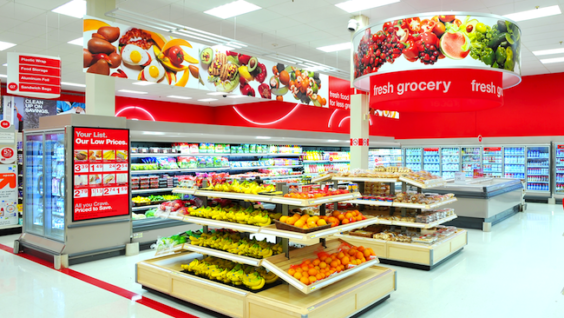
Shoppers frequently complain that there are never coupons and deals available for fresh, healthy food. But Target may be willing to give you a discount on your fruits and vegetables – if you don’t mind the fact that they’ve been sitting around in the store for a while.
As it works to reinvent its grocery offerings, Target is testing some new ideas in the produce section. One idea is familiar to shoppers who frequent the bakery or meat departments of many stores, but for some reason it hasn’t caught on in the produce department – reducing the prices of products that are nearing their expiration date.
Are the bananas a little brown? The lettuce a little limp? The melons a little overripe? Well, Target will knock down the price – and products that might otherwise be headed for the dumpster, can be yours for less than you’d pay for the fresh stuff.
Several test stores in Minneapolis, Boston and San Francisco are rolling out the new “dynamic pricing” feature this month. Signs placed around the produce section specify exactly when fruits and vegetables were delivered to the store, and they’re priced accordingly. In one store, pints of strawberries that “arrived today” cost $2.99, while those that arrived a week ago cost $2.49. Another store is selling week-old pints of raspberries for $3.49, instead of the $3.99 that the new ones cost.
If you’re planning to eat the fruits and veggies you buy in the next day or two, saving 50 cents here and there can really add up. Then again, there’s a potential risk in this approach – what if the fresher items’ prices are perceived as being hiked by 50 cents, instead of the older items being discounted by 50 cents? By definition, after all, charging less for the castoffs means charging more for the fresher food.
That’s why Target is testing the approach, along with a number of other initiatives, to see how shoppers react. It’s all part of the retailer’s plan to promote what it calls “food transparency”.
And there’s more to the plan than just offering discounts. Target is also working to develop “smart scales”. If you put an individual piece of produce on the scale, it will be scanned with infrared light, to determine how old it is, how it was produced and its nutritional content. And outside of the produce department, packaged foods in the test stores feature their ingredients printed right on the front, instead of hidden in small print on the back.
Target announced a revamp of its grocery department a year ago. It’s aiming to de-emphasize everyday grocery offerings in favor of more natural, organic and gluten-free products, specialty coffee and tea, wine and beer, local brands and fresh food. The retailer is also testing out several high-tech initiatives, like beacons that ping your phone with sales and deals, radio-frequency tags to help eliminate out-of-stock problems, and “digital service ambassadors” to assist anyone needing help with Cartwheel or their Target mobile app.
So innovations like the produce scanner and “dynamic pricing” combine Target’s new dual focus on healthy and high-tech. And if it means some of your groceries might be a little less expensive, too – all the better.
Image source: Target











Target can test all they want, but at an actual grocery you know Produce is about to turn (and has been priced to move) when the $5.99 tub of sliced cantaloupe has been knocked down to $0.99.
Fifty cents ain’t gonna get it done here, Target. Sorry.
I’m sure Target will have lots of old produce and meat, if enough people boycott their stores. I’ll just shop Walmart and Publix now.